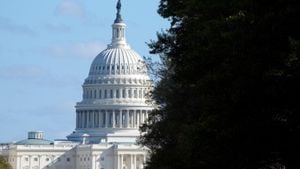The Church of England is reeling from the shocking fallout of the Makin review, which exposed systemic failures within its ranks related to the horrific abuse carried out by John Smyth, a barrister and camp leader, over several decades. The report has prompted significant changes, the most notable being the resignation of Justin Welby, the Archbishop of Canterbury, after he faced intense scrutiny for his handling of the abuse allegations.
John Smyth was not just any figure; he was influential within certain evangelical circles and had been accused of abusing more than 100 boys and young men, both in the UK and Africa, during the 1970s and 1980s. His abusive practices stretched across years, with many victims suffering silently due to the church's failure to protect them. Smyth passed away in 2018 without facing justice, which the Makin review highlights as a significant missed opportunity by church authorities to act when they had the chance.
This independent review, led by Keith Makin, painted Welby as having significant oversight failures and claimed he "could and should" have reported Smyth to the police back in 2013 when first presented with allegations. Critics pointed out the review revealed not only oversight by Welby but also by various other church officials, showcasing a culture of silence and neglect around the safeguarding responsibilities of church leaders.
The Bishop of Oxford, Dr. Steven Croft, publicly supported Welby’s resignation, calling it the “right decision” amid the uproar. He expressed his deep upset over the Makin report's findings, emphasizing the need to focus on the victims of Smyth's abuse rather than on church figures. "We must never be complacent and just say: this must not happen again. We have to make sure it doesn’t," Dr. Croft stated.
Another senior church member, the Bishop of St Edmundsbury and Ipswich, Martin Seeley, found himself named within the report as well. It was revealed he was allegedly aware of the accusations against Smyth yet failed to take appropriate action at the time. Despite being questioned during the ordination selection process for asking about Smyth, Seeley has since denied recollection of raising any such question relating to Smyth, claiming the selection procedures were governed by strict reporting protocols and were consistent for all candidates.
The report has not only initiated resignations but has ignited calls for broader accountability within the church's leadership. Survivors of abuse are now demanding firm action against bishops who permitted Smyth’s continued presence, asserting their complicity. The Makin review clearly stated, "the church knew of the abuse and failed to prevent it," highlighting how certain bishops may have ignored the red flags surrounding Smyth for years.
Individuals within the church, such as Sir Jamie and Rev. Sue Colman, also faced backlash for allegedly having knowledge about Smyth's abusive behavior, with calls for them to step down due to their perceived failures to protect the vulnerable. Rev. Sue Colman suspended her church activities following the publication of the review.
Welby's exit marks the end of his 11-and-a-half years as the Archbishop of Canterbury, during which he oversaw major shifts within the Church, including managing significant controversies and the church’s stance on social issues. His resignation, pivotal within the Church's crisis management, raises questions about the future leadership of the Church of England. With various figures already suggested to take over, including the Archbishop of York, the path forward involves not just selecting the next leader but ensuring systemic changes are made to protect those who might otherwise fall victim to abuse.
The institution faces criticism for its handling of internal matters, leading to demands for greater transparency and stronger safeguarding measures. Survivors and advocates have insisted upon the need for changes to both policy and culture within church communities. The church has pledged to prioritize safeguarding protocols moving forward, yet many remain skeptical about whether these pledges can lead to real, substantive change.
Those affected by Smyth’s abuse have bravely come forward, and their narratives are central to discussions about the need for reform. According to reports, many survivors only found the courage to speak out after the Makin review was made public. Advocates stress the importance of listening to these voices, emphasizing how past failures can no longer dictate the Church's present and future practices.
While the church's leaders are under increasing pressure, there's also hope for healing. Many within the Church of England are rallying to support survivors, offering resources and counseling as they navigate their experiences and the broader impact of these revelations. The Makin review serves not just to highlight past mistakes but also as the impetus for rebuilding trust within the community.
The ramifications of the Makin review will likely be felt for years to come, as the church grapples not only with its past but also its commitment to safeguarding future generations against similar abuses. With church leaders acknowledging the scale of the problem, the focus now shifts to action—a commitment to truly prioritize the safeguarding of all members of their communities.
Through this challenging chapter, those hurt by Smyth's actions and the church's neglect have made it clear: accountability must come first. The hope is for the Church of England to emerge not only as a place of worship but as safe havens where all members can feel protected and valued. Facing the sunlight of scrutiny, change may finally begin to take root.



